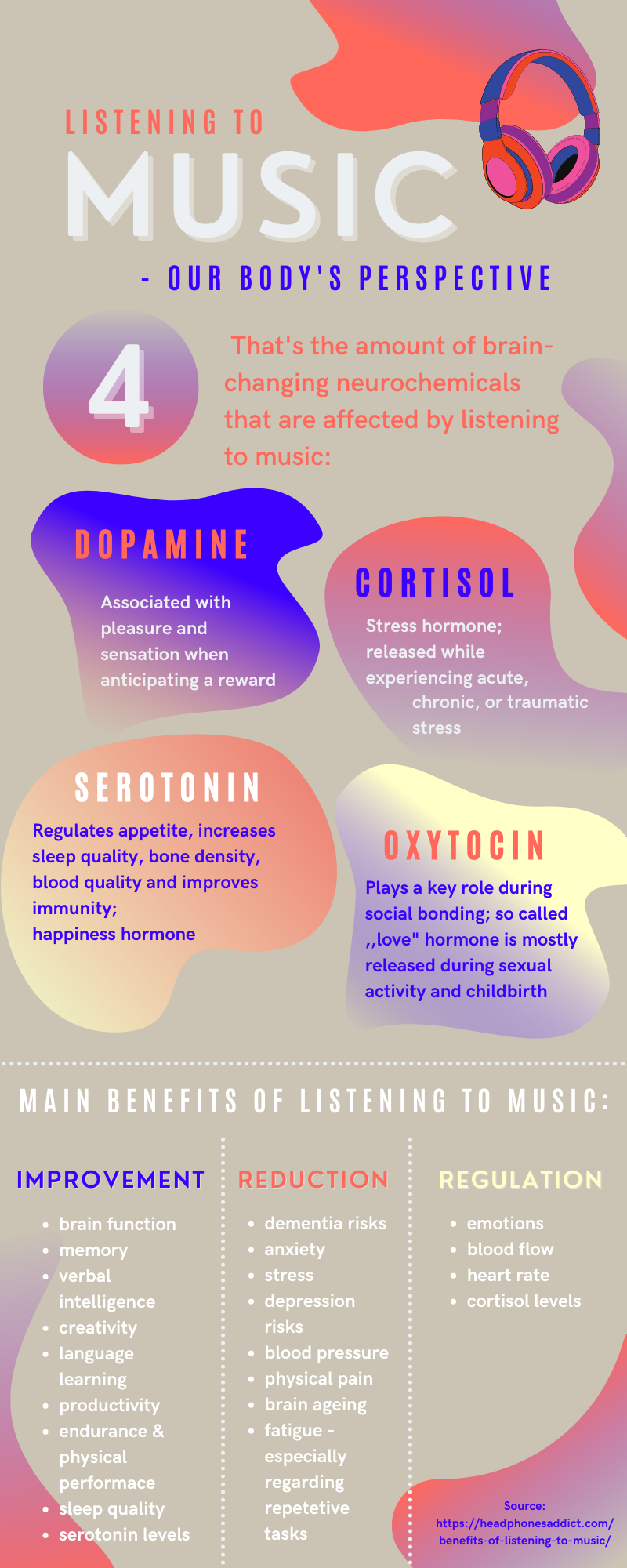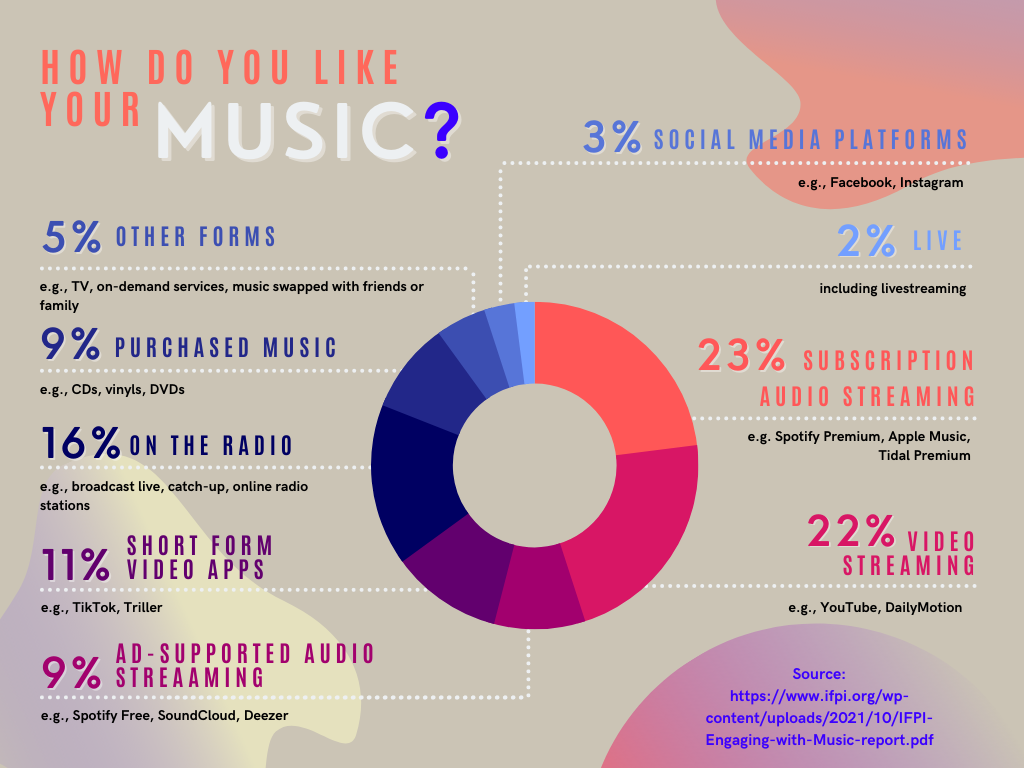Someday, during a regular walk or on your way to school or work, try to stop for 10 seconds to look around – that is short enough, so you won’t look like a weirdo, but long enough to notice that probably the majority of strangers that will pass you on the street will be having their headphones on.
And yes, they might be listening to their favourite podcast, or – what would fit our workaholic civilisation perfectly – even be on a business call. But we spend up to 18 hours per week on listening to music, and as 54% of us do so while commuting to work or school – there’s no doubt that at least some of those around you would do as well.
And there’s absolutely nothing surprising about that. According to studies, listening to music is not only a popular leisure activity, but actually appears extremely beneficial for our health.
Music – a remedy for everything?
Have you ever heard of such a thing as the amygdala? If not, that’s the part of our brain that is activated by music influence. It’s involved in processing and regulating our moods and emotions, and being active boosts the production of a pleasure hormone called dopamine. This one eventually helps in anxiety and depression reduction, but we’ll get to that.
Speaking about hormones, listening to music can help us reduce stress – it regulates cortisol levels by releasing biochemical stress reducers. Moreover, thanks to this our brain pays less attention to pain signals, so we feel less of it. Some studies have even shown that sometimes music works more effectively in pain reduction than meditation!
Here you can have a look to find out more about how listening to music is beneficial for us!

So, as you can see – music is, indeed, a remedy to many of our struggles. But there is one thing that’s not only proved by the info above, but probably the most obvious one – and the main, subconscious reason for us to save and enjoy our favourite tracks.
Listening to music improves our mental well-being – just like that.
Either if you are a casual listener, an audiophile or a melomaniac, music that we hear affects our mood. Especially by activating frontal and temporal lobes of our brains, it influences our thinking, emotional state and general well being. Some kind of connection to the melody, lyrics and emotions expressed by them in a song makes us relieved in various everyday situations – just like ,,katharsis” effect. According to psychology, when hearing sad songs, we amplify negative emotions regarding the hormone response with oxytocin and prolactin – which soothe the pain, reduce anxiety and bring us to our calm points. The authors of the study published in the Journal of Consumer Research suggest that unhappy music provides a substitute for an empathic friend. They compared it to the preference most people have for someone who truly understands what you’re going through. Similar process goes on with happy sounds – the difference lies in hormones, because this time it’s dopamine and serotonin boost that comforts us. Furthermore, this reaction appears to be an anti-depression kind of treatment.
After stimulating our hearing, our mind responds with the comforting wave of feeling understood, just like if we’d have a good, honest talk with a trusted friend. We identify with what we hear, and it doesn’t require too much of an effort – just putting the record on.
The proof for it is everywhere around us!
And no, we don’t mean only reading articles and theoretical studies. Reading fun-facts about benefits from using Spotify daily, entertaining yourself by going to a concert or relaxing by putting on our favourite CD is common among the Internet and too easy. What really impresses is seeing the effects on a bigger scale.
We had a closer look at European society to find out if there is any kind of connection between listening to music and happiness level per country. You know the phrase, ,,the easier – the better”? So it could not be more simple – all we did was to go through some statistics.
Wait a minute – there are many ways to enjoy music.
Indeed! Music can be consumed worldwide in many various ways, which makes each experience unique and so affecting. However, it’s hardly possible to compare all the audiences, especially as we are all a part of several of them – being a Spotify or Tidal subscriber does not forbid us from participating in a concert.

According to data provided by IFPI ‘s research, over 50% of music is consumed by streaming, what includes:
- Subscription music streaming; Apple Music, Spotify Premium, Amazon Music etc. – 23%;
- Video music streaming; YouTube, DailyMotion, etc. – 22%
Apparently, streaming is the most preferred way of music consumption – and its power’s increasing continuously.
[…] Streaming and revenues grew by 19.9% in 2020 to US$13.4 billion. Paid subscription streaming was the key driver of this, growing 18.5%. – IFPI Global Music Market Overview, 2021
The rest of consumption is taken by radio, short video apps like TikTok (or Vine in the past), ad-supported music streaming (as on Deezer or free Spotify variant), social media, other channels like TV or live performances. However, as listening via streaming stays out of all the most, we decided to analyse streaming levels regarding each country in Europe.
Which country is the best listener then?
As now we know which way of music consumption is most preferred, we can jump straight into statistics to check what’s the tendency among European countries.
From what we see here, countries with the highest rate of listening to music via streaming services in 2020 were the Scandinavian ones - with Iceland leading the race, next to 84% of its population that declares themselves to be streamer-listeners. There are Norway, Finland and Denmark following, so the top is wholly occupied by Northern countries. You can see the map overview below.
Basing on geographical presentation, it’s clear that the further in the north country lies, the more of their Internet usage they dedicate to music consumption - and it makes sense, taking into account that after Scandinavian group there are also Estonia and Netherlands in the top 8 . A lot of devoted listeners we can find in the most party-known, mediterranean cultures - Spain and Malta are also quite high in the ranking, with 63% and 62% visible on the chart. Taking another perspective, at the end of the ranking we can find countries like Montenegro (39%), Bosnia and Herzegovina (36%), and Bulgaria (30%). You can explore all the countries above and changes in the tendencies yourself by sliding the colour scale in the left upper corner.
Did you know...
... that apparently we use the Internet more for social media activities than listening to music? Yet 20 years ago, Facebook, the most known social media platform worldwide wasn’t even a thing - and today, Meta company, which owns not only Zuckerberg’s work, but also Instagram and WhatsApp, probably consumes more of our time than one of the most basic hobbies one can mention. It does not apply to all the countries of course, but the question is - when staring at our phones and scrolling for hours became more interesting than enjoying music?
Okay, but we need to return to our main question. We know the streaming per countries - let’s see how it corresponds with their well-being then!
World Happiness Report - here's the fun part :D
Updated annually, The World Happiness Report is not only about feeling happy - actually, it's about general well-being . To make the results more complex, researchers are preparing an average for the specific year's report, based on the past three years of surveys - excluding the year in which the report was published. That is if some countries would lack the survey for some year, and also to include exceptional phenomena, e.g., the COVID-19 pandemic was taken into consideration while creating the 2021 report (fun-fact: they used 2020 statistics and an average for 2017-19, so 4 years taken into account).
In our case, the most reasonable choice would be to take a look at the latest version of the documentation. In World Happiness Report 2022 we can see the average for countries around the world, based on years 2019, 2020, and 2021. Both a year before and after our music statistics were done are taken into the average, but considering previous reports - that’s the most suitable choice for our research. So then, shall we?
Generally speaking, the latest WHR research shows that Europe's levels of happiness weren't so bad. Taking into account the scale used here, which is that 0 stands for ,,unhappy" and 10 as ,,happy", we only have one country below something in the middle - and that would be Turkey, with their score for 2022 report escalating around 4.70. What is intriguing regarding our interest, is that the top is taken by Scandinavia - again! Finland seems to be the most satisfied, with their levels of happiness pointing number 7.82; then it's followed by it's neighbours as Denmark (7.64), Iceland (7.56), Netherlands (7.41), Luxembourg (7.4), Sweden (7.38), and Norway (7.37). What's more, Bosnia & Herzegovina, Montenegro, Bulgaria reached 5.77, 5.55 and 5.37 consecutively - the bottom of statistics, exactly as they did in the previous set describing their relationships with streaming.
No worries - we know that it's a lot to take in. Let us make it easier for you :D
Here you can see both factors compared. Each bubble stands for one country, expressing its population by the size of the marker. With Europe divided into regions represented by colours, there’s no doubt that northern countries win the race for happiness, simultaneously with music streaming being more significant in their daily life than for other players. A kind of tendency can be observed; western Europe still figures high in the ranking, beating countries from its central and western neighbours, especially Balkans - occupying the lowest rates.
It is to remind that well-being declarations depend on many elements of our day-to-day existence; they could be financial satisfaction, personal situation, freedom of speech and choices, generosity, healthy life expectancy and many more listed and described by the statistics provider. We learn in elementary schools that, especially speaking about Europe, countries with higher income and GDP per capita can legitimately have higher levels of life contentment. But there are also many studies and explanations done, e.g., as this one from Harvard Health Publishing, making clear that even lack of light can be a serious problem regarding risks of chronic depression - which is commonly associated with Scandinavian countries due to that issue.
Lack of light [...] can cause your brain to produce too much of the sleep hormone melatonin and to release less serotonin, the feel-good brain chemical that affects mood. The result of this chemical imbalance? You feel low and lethargic. Other common symptoms [...] include lack of sexual energy, overeating (especially from craving high-carbohydrate and high-calorie comfort food), and social withdrawal. - ,,Shining a light on winter depression'' (2019); Harvard Health Publishing
And here we are, observing that in the same time, Finland is placing itself on the first place in Happiness Ranking for several years now.
From 2013 until today, every time the World Happiness Report (WHR) has published its annual ranking of countries, the five Nordic countries – Finland, Denmark, Norway, Sweden, and Iceland – have all been in the top ten, with Nordic countries occupying the top three spots in 2017, 2018, and 2019. - ,,The Nordic Exceptionalism: What Explains Why the Nordic Countries are Constantly Among the Happiest in the World" (2020) ; World Happiness Report 2020
Nevertheless, the specific study regarding northern happiness took place over 2 years ago, they figure at the highest position til this day. All the countries mentioned in this piece are at once among the top listeners.
So, what do we know as far?
We see which countries are the happiest - and we know about the factors that are obvious to interrupt their well-being states. We realised which of them are listening to music the most and how they do so. Finally, we are aware of many benefits coming from adding music to our everyday lives.
The authors of this article are neither scientists, nor professional researchers - it’s simply a casual observation done, regarding our interest and the idea of fulfilling curiosity. But since the most comprehensive source, the Internet itself, does not scream about the potential correlation on this scale, when it’s clearly visible - maybe it’s high time for some people to connect the dots?
Come on - maybe Spotify being found in Sweden is not a coincidence? :D
